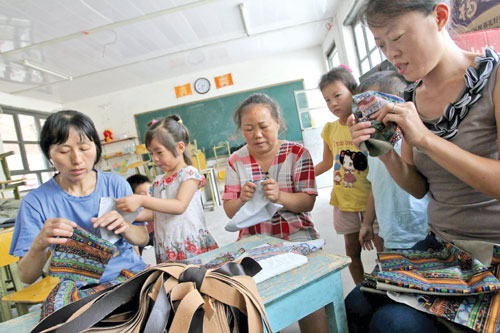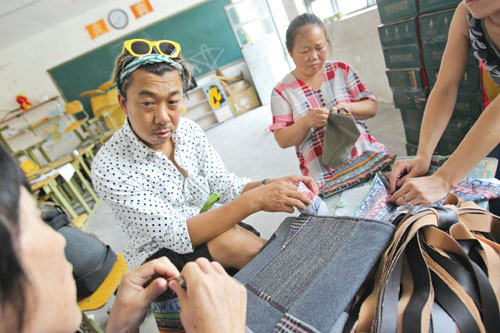Good business
 |
|
Members of the Tongxin Needlework Cooperative in Beijing's suburban Jinzhan township make fashionable items from secondhand materials. Photos by Jiang Dong / China Daily |
 |
|
Zhang Huixiang has established Brandnu for social enterprises and ethical trading. |
A Beijing store that has become a hub for social enterprises operates according to the motto: 'Empowering women through ethical trade'. Erik Nilsson reports.
Migrant worker Wu Caixia doesn't expect to ever earn enough to get surgery for her eye disease but says she still "sees hope" for her future as a producer for the social enterprise Brandnu.
The 41-year-old Hunan province native and member of the Tongxin Needlework Cooperative in Beijing's suburban Jinzhan township says her colleagues are excited about the "big deal" they have made with the company - that is, to earn 30 yuan ($4.80) for every meter of cloth they fashion from secondhand materials.
"That's much more than we get to keep from making other items," Wu says.
Related: Services for migrants 'help development'
A portion goes to the producer's salary, while the remainder is equally divided among funds for public accumulation, cooperative development and annual bonuses.
Outside of orders for Brandnu, every member of the six-woman cooperative can earn about 300 yuan a month producing rag dolls, mops, dance shoes and aprons for the market, which only allows them to keep a few yuan per item they make.
"I just save the extra money from Brandnu's orders to pay my children's tuition," the mother of three says.
Before, her carpenter husband earned the sole household income of about 2,000 yuan a month.
The boutique in Beijing's trendy Wudaoying Hutong, near Beijing's Lama Temple, is one of China's first social enterprises.
Social enterprises - popular in the West, yet hardly known in China - are nonprofit or commercial ventures that guarantee producers' wages and welfare before investor profits. Those that engage in fair trade ensure the people at a commodity chains' first links get a fair slice - at least 10 percent of the retail price - of the value they add.
"The store has become a hub for social enterprises and ethical trade," Brandnu's founder Zhang Huixiang says.
His brand operates according to the motto "Empowering women through ethical trade", according to the clothing tags.
"Women take more responsibility in the family," he says.
"They take care of the parents and the children."
Zhang hopes to expand the number of women he directly works with from three to 15 this year, he says. He also plans to provide them training, so they can produce and earn more.
"The social perspective will bring attention to (China's) rural communities, where reform and development haven't yet done them any good, because they still don't have access to education or the other things urbanites have," Zhang says.
"It can change people's thinking. Many people in China are just after profits and money. This might make them think about what life is about."
Zhang says his customers were about 60 percent foreign when his shop opened in 2009. But locals now account for about half.
"Most people who know about fair trade are educated, socially conscious and often wealthy," Zhang says.
"These are the people who can change society. I don't know if it can happen in China, but it could be a small revolution within a small group. But they can be influential people, who can create change."
But Zhang points out that his store isn't a charity.
"If you like something, you buy it. If you don't, you don't," he says.
"I'm not raising (charity) money. It's a business but one with a different model - a win-win situation."
So, Zhang emphasizes the quality of his wares.
"It not only has to be ethical trade and benefit rural women but also must be high-quality and cool," he says.
Zhang developed his interest in social entrepreneurship and secondhand goods during his 10 years in Canada, where both are popular, he says.
He explains the items from his fashion line are "up-cycle", meaning not only are they created with reused and redesigned materials but also are "made better than their original forms".
Zhang became interested in fashion when working as a chief director for Bingtuan Star TV, after he returned to China in 2008.
"It was a crazy job with a crazy schedule," Zhang says.
Pink plastic-framed glasses push his bangs up on his forehead. The specs match his pink, collared shirt with rainbow plaid lining, which he wears open over a black, striped shirt with a yellow collar and ethnic knitting for the front pocket - his own creations.
As he speaks, he scrawls designs for bags shaped like flamingos and turtles on his sketchpad.
"Social enterprises should focus on the product. It should look good and feel good," Zhang says.
"I don't want to sell a story. A lot of Chinese products sell the tears first. I'd rather the customer discover the story rather than have me tell it."
The Tongxin cooperative's women say the story of social enterprises' potential in China is one of hope.
But challenges persist, the cooperative's manager Shen Jinghua explains.
"Although we get a high percentage of the profits, it's an immature business model," the 28-year-old Hunan native and mother of two says. "We still lack equipment and major sales channels."
Wu shares Shen's aspirations.
"I hope we can get more orders," she says.
"Then, our salaries will really improve and our lives will, too."
Contact the writer at [email protected].






















